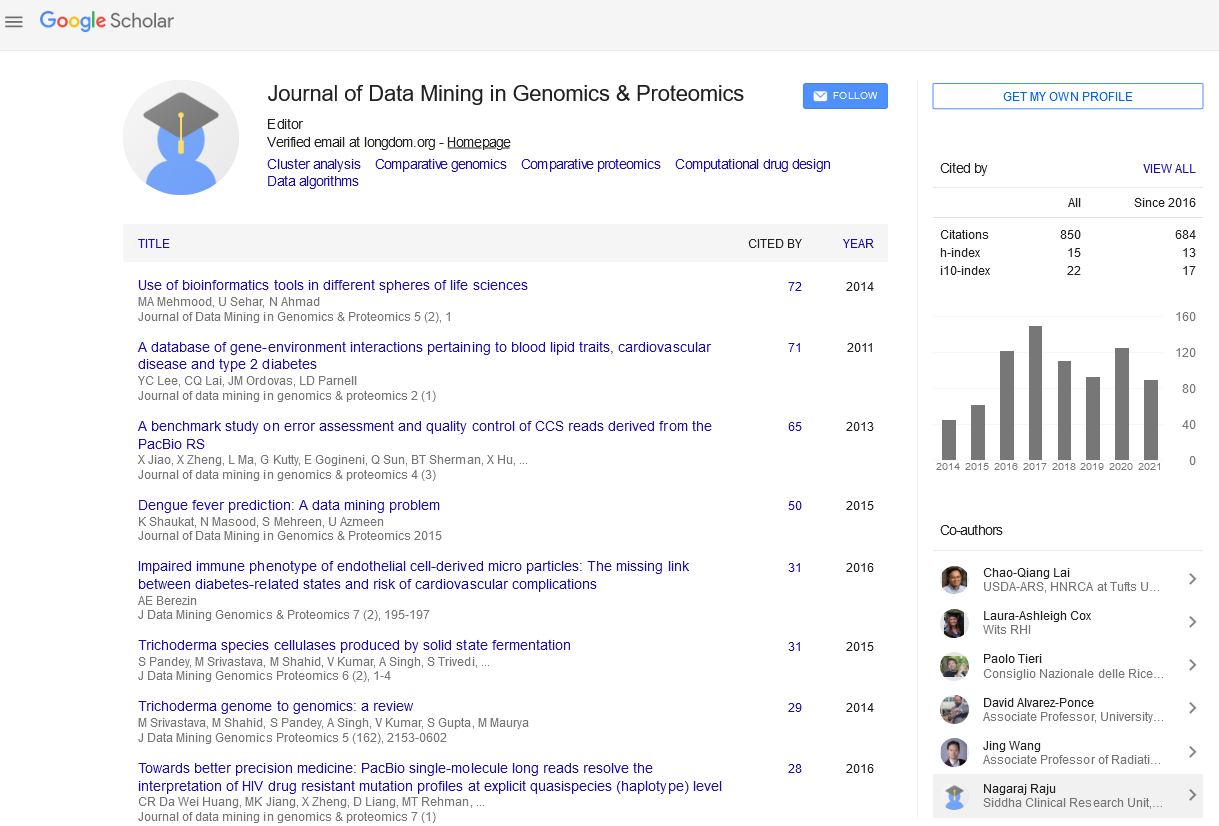PMC/PubMed Indexed Articles
Indexed In
- Academic Journals Database
- Open J Gate
- Genamics JournalSeek
- JournalTOCs
- ResearchBible
- Ulrich's Periodicals Directory
- Electronic Journals Library
- RefSeek
- Hamdard University
- EBSCO A-Z
- OCLC- WorldCat
- Scholarsteer
- SWB online catalog
- Virtual Library of Biology (vifabio)
- Publons
- MIAR
- Geneva Foundation for Medical Education and Research
- Euro Pub
- Google Scholar
Useful Links
Share This Page
Journal Flyer

Open Access Journals
- Agri and Aquaculture
- Biochemistry
- Bioinformatics & Systems Biology
- Business & Management
- Chemistry
- Clinical Sciences
- Engineering
- Food & Nutrition
- General Science
- Genetics & Molecular Biology
- Immunology & Microbiology
- Medical Sciences
- Neuroscience & Psychology
- Nursing & Health Care
- Pharmaceutical Sciences
A novel splice variant of G-substrate in humans? Potential implications for animal models of Parkinsonâ??s disease
2nd International Conference on Big Data Analysis and Data Mining
November 30-December 01, 2015 San Antonio, USA
Alastair Aitken, Maa Vigbedor, Sebastian Beck, Nicola Houston, Helen Falconer and Mayank Dutia
University of Edinburgh, UK
Posters-Accepted Abstracts: J Data Mining Genomics Proteomics
Abstract:
We investigate the function and regulation of proteins (14-3-3 isoforms in particular) involved in neurodegenerative diseases including Alzheimer�??s and Parkinson�??s. Our recent studies include G-substrate (named as a specific substrate of cGMPdependent protein kinase). It is a potent inhibitor of protein phosphatase 2A (PP2A) when phosphorylated on two threonines. Dopaminergic neurons of the substantia nigra, which express a higher level of G-substrate are less vulnerable to PD toxins than the adjacent A9 DA neurons. An mRNA for a shorter G-substrate variant has been described. Our database searches indicate that this variant is expressed only in humans. This may have implications for the current animal models of PD. We have compared the expression and function as inhibitor of PP2A of this variant (that retains one of the phosphothreonine motifs) It has a different specificity for protein interactions and may play an important role in the protection of DA neurons. We have identified novel G-substrate interacting proteins involved in PD. We have shown that G-substrate is degraded by the cysteine protease, DJ-1 (a causative gene for familial PD, also called �??PARK-7�?�). DJ-1 may function only as a dimer and is responsive to oxidative stress. A DJ-1 Leu166Pro mutant predisposes the carriers to early onset PD and disrupts the function and dimerisation of the protein. We discovered that a drug used in the treatment of acute vertigo for over 40 years, but whose mechanism of action was unknown, interacts with DJ-1. Our initial results suggest that the drug protects against oxidative stress and we are analyzing the interaction in our drug development program.
Biography :
Alastair Aitken completed his Ph.D. from Edinburgh University and did postdoctoral studies at the Pasteur Institute, Paris then at Dundee University with Prof Philip Cohen. After a lectureship at University of London followed by research at the National Institute for Medical research, Mill Hill, London he is currently professor of protein biochemistry. He has published nearly 200 papers and reviews in high impact journals including Nature, Cell, J Biol Chem and EMBO J. He is a past or present editorial board member of journals including J Biol Chem; Biochem J and FEBS J.


